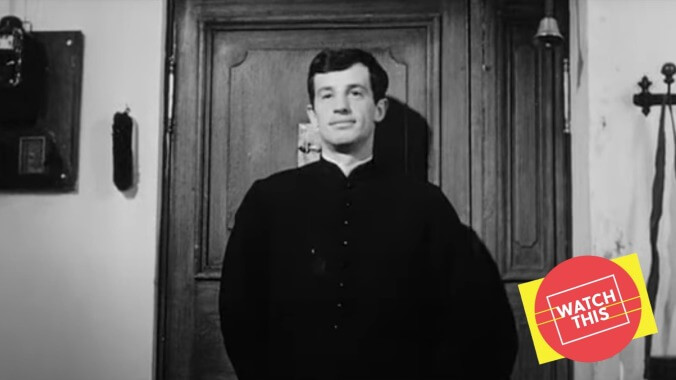French New Wave icon Jean-Paul Belmondo played against type as Léon Morin, Priest

Watch This offers movie recommendations inspired by new releases, premieres, current events, or occasionally just our own inscrutable whims. This week, ahead of Easter, we’re looking at films about Christianity.
Léon Morin, Priest (1961)
Just a year after Breathless turned him into an icon of the French New Wave, Jean-Paul Belmondo delivered one of his finest performances as the title character of Léon Morin, Priest, bringing his casual swagger, confidence, and sex appeal to the role of an intellectual clergyman. It was a canny bit of against-type casting from the great Jean-Pierre Melville, for a film that stands apart from the crime and gangster pictures for which the French director is best known. Given its setting in a small Alpine town during the Nazi occupation, Léon Morin, Priest sits closer to Melville’s two other films about occupied France (Le Silence De La Mer, Army Of Shadows), but its focus on religious struggle earns it a place of distinction in the director’s body of work. For this reason, the film also clarifies certain aspects of Melville’s filmography: In drawing an implicit link between organized crime and organized religion, Léon Morin, Priest points to the individual faith required in both, and the solitude one might feel in one’s commitment to either.
Despite the film’s title, though, Belmondo’s Léon Morin isn’t actually the main character. That distinction goes to Barny (Emmanuelle Riva, another New Wave icon), a young widow of a Communist Jewish husband and the mother of a young girl. She is also, as it happens, a lapsed Catholic—though when she first goes to confession, she does so out of boredom rather than any sense of guilt. As Barny tells a friend, priests live off of “false currency,” so she decides to confront one as a kind of joke, only to find herself blindsided by Morin’s devotion, intelligence, and forthrightness. Rather than back away from her indictments of religion, Morin goes on the offensive. And after hearing his brusque but incisive arguments, Barny finds herself examining her life in a way she never had before.
Following this initial encounter, much of the film’s runtime is devoted to weekly meetings between Barny and Morin to discuss matters of religion, which are by turns heated, tense, scintillating, exasperating—and, of course, sexually charged. Barny’s newly awakened religious searching is mixed in with her attraction to Morin, while his desire to bring new followers into the Church is inseparable from how he deploys his status as the only man in the area, charming not just Barny but also some of the other women in the village. (The rest of the men have either been deported or are involved in the Resistance.) It’s significant, though, that Melville doesn’t play Barny’s relationship with Morin for cheap irony, or use religious questions as mere fodder for a lurid psychosexual drama. Rather, he earnestly engages with the prickly, irreconcilable aspects of their ambiguous association. He demonstrates how a person’s individual struggles are always bound up in—and conditioned by—a larger social context, and in doing so draws out how body and spirit are inextricably intertwined.
Melville adapted Léon Morin, Priest from Béatrix Beck’s autobiographical novel of the same name, which he called “the most accurate picture I have read of the life of French people under the occupation.” And though he eventually cut out about an hour’s worth of footage about the Occupation in order to focus on Barny and Morin, much of the film’s richness lies in how its central story of religious confrontation brushes up against its political backdrop. The film has no shortage of charged detours: a group of women planning to secretly baptize their half-Jewish children, Barny’s decision to have her daughter live with another family for safekeeping, and a scene following her village’s liberation, where she is harassed by a pair of American soldiers.
This is also to say that Léon Morin, Priest is frequently as gripping as any genre movie Melville has made. (Reviewing it upon its 2017 re-release, J. Hoberman called it “a theological action film,” which is about right.) Working with cinematographer Henri Decaë, Melville observes the proceedings with an adroit, dispassionate eye—the better to bring out the fiery, life-and-death confrontations unfolding amid the film’s stark, shadowy surfaces. A remarkable shot of Barny steadying herself on a banister, while Morin stands on top of the stairs, succinctly conveys Léon Morin, Priest’s fundamental virtues: the physical force of a religious confrontation, and the sense of isolation that can surface no matter where one stands in relation to God, or to anyone else.
Availability: Léon Morin, Priest is available to stream on Kanopy, DIRECTV, and Watch TCM.